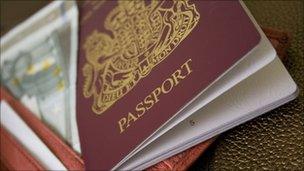Businesses urge caution on immigrant limits
- Published

The UK faces a shortage of civil engineers among other skilled workers
Vince Cable's calls for "flexibility" in the government's plans to cut immigration will be welcomed by many businesses.
In the past, business groups have expressed concern over the impact a cap on immigrant numbers - now on the cards for April next year - could have.
When the Conservative party first proposed the idea of limiting the number of non-EU immigrants in 2005, the Confederation of British Industry (CBI) was among those strongly opposed, arguing that a steady influx of immigrants was essential to keeping the UK economy going.
"If we have a cap of any sort it will tie businesses' hands from the flexibility which is, after all, the hallmark of the British labour market," said the then head of the CBI, Sir Digby (now Lord) Jones.
Economy risk
"If it was not for immigrant labour, especially in leisure, in tourism, in agriculture, in construction, then frankly many of our businesses would not have the workers we need."
But the lobby group has since softened its approach, however, admitting that wider social and political concerns with immigration now need to be balanced with British businesses' recruitment needs.
But those recruitment needs, others argue, cannot be ignored.
"The stakes for the UK economy are very high," said David Frost, head of the British Chambers of Commerce (BCC), following the government's decision to consult industry over its immigration cap plans in June.
"If restrictions on the entry of highly skilled non-EU migrants are too strict, there could be damage to the economy and to future economic growth.
"It is absolutely essential to get the balance right."
The Federation for Small Businesses takes a stronger view:
"We believe [an immigration cap] will have an adverse effect," said David Ramsden from the FSB, giving evidence to MPs on the Home Affairs Committee last week.
"There is a certain immediacy when we have vacancies and we believe a cap could prevent us getting the right persons for the right jobs as soon as possible."
So why are the UK's businesses so reliant on foreign workers, and why are British workers unable to fill the gap?
Skilled workers hit
Many businesses simply argue that British workers do not have the skills required for many jobs.
The BCC says its members frequently complain that the "soft skills" that make people employable are basically missing in local workers, forcing them to turn to EU and non-EU labour markets.

The government's immigration cap will target workers from outside the EU
Care homes is one example it cites. But the skills gap is broader than that, and is officially recognised by the government.
The UK Border Agency's points-based system lists a whole range of jobs for which there is a current shortage, with non-EU workers invited to apply.
They include civil engineers for major construction projects, as well as electrical, mechanical and chemical engineers, various medicine and health care roles, maths and science teachers and care workers.
The worry, according to the BCC's Adam Marshall, is that it is the skilled workers who will be caught out by an immigration cap, not the unskilled migrants moving from within the EU.
"What if [a company] needs an engineer with specialised skills in October or November but the cap for that year has already been exceeded?" he asked the Home Affairs Committee.
"Does it mean it takes the decision not to expand its business?
"Does it have other options open to it when it knows that a British person with the same qualifications and levels of skill may not be available for four or five years because it needs to train the individual up from scratch?"
Immigration is now firmly on the political agenda. Business leaders will be looking to Vince Cable to ensure that their voice is not drowned out.